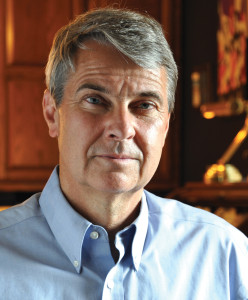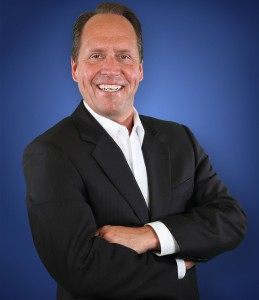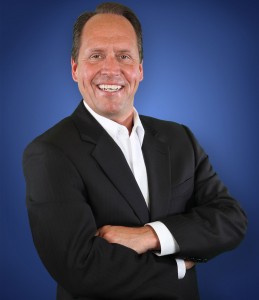By RP Nation, on Wed Jul 2, 2014 at 10:00 AM ET  Fifty years ago, when President Lyndon Johnson signed the Civil Rights Act of 1964, I was in elementary school and had no clue about the law that would drastically change daily life for African-Americans. I surely had no idea how it would improve life for white Americans like me. Fifty years ago, when President Lyndon Johnson signed the Civil Rights Act of 1964, I was in elementary school and had no clue about the law that would drastically change daily life for African-Americans. I surely had no idea how it would improve life for white Americans like me.
This historic legislation outlawed discrimination on the basis of race, color, religion or national origin at “places of public accommodation.” The movie theater I frequented had to discard its “coloreds only” entrance and the segregated balcony. Restaurants where we ate had to let African-Americans out of the kitchens and into the dining areas. My future friends, like state Sen. Reggie Tate of Memphis, were no longer excluded from admission to the Mid-South Fair six days a week.
The new law gave the U.S. attorney general authority to seek redress when school boards deprived students “of the equal protection of the laws.” Two years later, my school in Weakley County, Tennessee, was desegregated. And for the first time, I began to spend time daily with African-American children. I had new friends in the classrooms, and the lessons went beyond reading and writing.
After signing the Civil Rights Act, President Johnson said to an aide, “We (Democrats) have lost the South for a generation.” The president underestimated the political impact, which continues now two generations later.
In 1966, just two years later, the people of Tennessee for the first time popularly elected a Republican to the U.S. Senate.
In 1968, in Memphis, the sanitation workers went on strike and Dr. Martin Luther King Jr. was struck down. In Nashville the Republicans took control of the state House of Representatives for the first time since Reconstruction. Then in 1970, Tennessee elected a second Republican to the U.S. Senate, throwing out Democratic Sen. Albert Gore Sr.
Despite the backlash, the Civil Rights Act changed customs and changed society. With those changes, what could not have been imagined in 1964 became reality in 2008: An African-American was elected president.
Yet some Republicans responded to this historic progress with crude jokes and racist appeals to fellow bigots. In just one of many examples, a Tennessee Republican state legislative aide sent e-mails caricaturing President Barack Obama’s official portrait as two cartoon eyes peering from a black background.
When in 2010 I ran for Congress, racism was too easy to find. I can still see the angry face of the man at the duck supper who responded to my handshake with “Lemme talk with you about your (N-word) president.” And the scowling man at the rodeo who snarled, “I don’t shake hands with darkies or Democrats — and they’re often the same.”
Thankfully, most Republicans are not racists. But while most Republicans would never discriminate, degrade or demean, their leaders’ legislative actions still repress voters and reverse progress.
All over the country, Republicans are pushing new impediments to discourage and decrease voting by minorities and low-income citizens. While Republicans say they oppose big and oppressive government, they rammed through Tennessee’s government ID law, now notorious as one of the nation’s most burdensome. Only certain government cards now are acceptable at the polls, after Republicans outlawed using a Social Security card or even photo ID cards from the Memphis public library or the University of Memphis. Those without a driver’s license – nationally, 25% of African-Americans – now must go to a driver’s license station, but fewer than half of our counties even have such a station.
Republicans claim these laws fight voter fraud, but instances of persons trying to vote while using someone else’s identity are almost nonexistent. And researchers at the University of Southern California showed strong evidence that “discriminatory intent underlies legislative support for (these new) voter identification laws.”
The first book of the Bible teaches, “So God created humankind in his own image, in the image of God he created them.” God’s image does not have a color, but it does have a creed. The Apostle Paul put it this way in Galatians 3: “There is neither Jew nor Greek, there is neither slave nor free, there is neither male nor female, for you are all one in Christ Jesus.”
Our American ideals long have taught that we are one. The Great Seal of the United States proclaims “E pluribus unum” — from many, one.
But it was just 50 years ago today that statesmen and idealists and people of a deep faith in Almighty God and in America together created the Civil Rights Act of 1964. Let us celebrate their good work for justice and freedom. And let us carry on their good work, so all God’s children can live in peace and love in truth.
Roy Herron is chairman of the Tennessee Democratic Party. Communications director Rick Herron and interns Garrett Jennings and Hannah Oakley of the state Democratic Party assisted in researching and writing this column. This piece was cross-posted, with the permission of the author, in the Commercial Appeal.
By RP Nation, on Thu May 22, 2014 at 3:00 PM ET  As one door closes, another one opens. Sometimes it takes a few shakes of a lamb’s tail. Sometimes it feels like you’ve tredged up the hill both ways in the snow, barefoot, exposed, vulnerable, in shark-infested water with no life preserver, on an island by yourself with a volleyball for a best friend…. As one door closes, another one opens. Sometimes it takes a few shakes of a lamb’s tail. Sometimes it feels like you’ve tredged up the hill both ways in the snow, barefoot, exposed, vulnerable, in shark-infested water with no life preserver, on an island by yourself with a volleyball for a best friend….
Wait. Too much. Dial it back. Sometimes I get so excited to tell the similar tales of endearment and struggle I was raised on by my (founding) father(s) that I get too ahead of myself. I also remember that although we share the foundation of struggle, our stories and generation gaps, so to speak, fill the holes. They pave a way of evolution for the tykes that come next. That in spite of our differences, we share the same principles. We raise and are raised to fight. We fight to make this world a better place.
That said, I can only speak to unemployment in this day in age, and that is what I’ve been. Unemployed. You feel like a bright, eager, talented, little twerp. You feel so passionately about pouring yourself into your career and being the best and the most. You feel so much feeling that when the checks stop, the spirit leaves you. You hate the phrase, “The glass is half full” because you are drained by being a drain of resources, knowing you can be a source that recharges the economic battery. Wanting to do that. Feeling that. Lots and lots of feeling in our generation…
And sharing. Pouring it out in public, looking for dignification.
I have been one of the lucky ones. I posted an article here on The Recovering Politician about my laments of being unemployed, and within ten minutes, I had multiple responses. People reaching out to help. People reaching out to learn how they could help. People as conduits. People offering to learn more about me in an effort to hire me directly. People that had known of my struggle, but when pen came to paper and a Word document met a blog, felt too, the existence of empathy – generational gaps and all.
That article was my own personal white flag. I thought that before I had done so, I had reached my bottom. It wasn’t until I wrote those words and exposed my feelings that I truly felt like it was time to make the climb. It was then I realized I didn’t have to climb alone – up the hill, both ways, in the snow, shark-infested waters…yadda, yadda, yadda. It was time that I changed “feeling” into acting.
As soon as I acknowledged I needed help in the most public and Gen-Y way possible, my digital smoke signals got picked up by the captain of a major vessle.
I am so pleased to announce that I am no longer unemployed – and haven’t been for some time. Two weeks after I posted the first article, I sat down to have simple, genuine dialogue that would pave the way for a brand new journey. Walking hand-in-hand with the most surprising of mentors in the most serendipitous of circumstances.
My Old Definition: Mad Woman Among the Mad Men. Advertising Agency World left me cold, bitter, ill-adjusted, unrefined, crass.
 My New Definition as a Work In Progress: Polished Professional Woman, deemed so by her peers, her predecessors, succeedors, family, friends, and mentor: Shelia Bayes. My New Definition as a Work In Progress: Polished Professional Woman, deemed so by her peers, her predecessors, succeedors, family, friends, and mentor: Shelia Bayes.
I have been taken under a wing of a strong, female mentor. As much as I have been taken under a wing, I am also being taken very seriously. I have a full glass if I choose to partake. I also have the responsibility of filling the cup. I plan that, the time I spent wallowing and feeling pitiful about how eager and passionate I am, that I am overdue to have this cup runneth over. For myself – for the company I am proud to be an ambassador of – and – for the people willing to take a chance on me when I was sailing uncharted, scary waters.
I think big. I dream big. I fill my heart and my hopes with nothing but…big. I am the quintessential millenial with big hopes and big dreams. I would be kidding if I tried to state anything less.
So, as one chapter closes, another one opens. Thus is the beauty of life. I said in closing of my last article: “Career, life and love are like great bourbon. They’re fun when they’re young, but there’s something sweet and powerful when they get a little age on ‘em.”
“Oh, and they’re more of a commodity too. Because they’ve grown to become something very special. The days of boxed wine and cheap seats are over for this gal. At least that’s the metaphor. I will be drinking boxed wine and looking on from the nosebleeds until I find a job that soothes the pockets…and then lines them….”
Well, folks? Career seems to be shaping up to be beautiful medley of foundation, confidence and passion, coupled with the good old fashioned molding from those who take a special interest in raw, unpolished, mouthy pieces of (art)work. Boy, she’s got her hands full. Pat her on the back when you see her, will you?
****
I close with the same phrase as before, with subtle differences: “Love? I assume that may be next. Life? Well that’s what I’ve had all along. I won’t be waiting for wrinkles to become special. This is one thing I’m confident of; a sweet gift I do have in my half-empty pocket that is sure to surprise.”
UPDATE: Here’s to lining pockets, wrinkles in time – not on faces; faces that smile, smiles that ignite. Here’s to a remix to ignition, a new definition, and yes, if anyone asks? We DID start the fire.
Here’s to fires that burn so brightly you can see them from space. Here’s to opportunity, whether it be from failure, honesty, success, or flat-out digital SOS smoke signals. Here’s to sweet, simple, serendipitous moments and the spirit for life that can manifest again and burn so brightly – for a little twerp like me – ready to take things on with vigor. We have a new captain, a charted course…and we are full steam ahead. That’s so stinking cool. Oh, life…aren’t you full of stories. You wanker, you.
By RP Nation, on Wed May 7, 2014 at 10:00 AM ET  Bruce Tuckman first introduced the Form, Storm, Norm, Perform model of Team Growth in 1965. He maintained these stages were not only predictable, but necessary and inevitable in order for a team (and I would say an organization) to achieve peak performance. Over the years, I’ve used this model in a variety of settings and continue to be amazed at its far-reaching applications. The following is a brief explanation of each stage: Bruce Tuckman first introduced the Form, Storm, Norm, Perform model of Team Growth in 1965. He maintained these stages were not only predictable, but necessary and inevitable in order for a team (and I would say an organization) to achieve peak performance. Over the years, I’ve used this model in a variety of settings and continue to be amazed at its far-reaching applications. The following is a brief explanation of each stage:
Stage 1. Form
Individual behavior is typically driven by a desire to be accepted by others and avoid controversy or conflict. Individuals gather information and make initial impressions about each other. The form stage is important as team members have a chance to get to know each other, exchange personal information and establish relationships.
Stage 2. Storm
Most teams will eventually encounter conflict where personal agendas are revealed and interpersonal hostility is generated. If successfully managed, this period of storming leads to a new and more realistic setting of objectives, procedures and norms. The storm stage is necessary to the growth of the team. It can be contentious, unpleasant and even painful to members of the team who are averse to conflict. Tolerance of each team member and the appreciation of differences should be encouraged.
Stage 3. Norm
At this stage, team norms, common practices, policies and procedures start to emerge. How decisions are made, the degree of openness, trust and confidence is established. Team commitment builds during this key transitional stage.
Stage 4. Perform
Only when the three previous stages have been successfully completed will the team be able to achieve true peak performance. Even the most high-performing teams can and do revert back to earlier stages in certain circumstances (new leadership, introduction and/or exodus of team members, crisis situations, frequent change).
One of my favorite movies is Hoosiers starring Gene Hackman as Norman Dale who arrives in the rural southwest Indiana town of Hickory to become a high school teacher and head basketball coach. This movie is not only a classic; it’s a wonderful illustration of Form, Storm, Norm & Perform. For example:
Form: At his first practice, Coach Norman Dale immediately dismisses the interim coach. And minutes into addressing the players, he dismisses two players for not paying attention when he speaks. He then begins drilling the remaining five players with the fundamentals and the need for conditioning. True to the Form stage, Coach Dale is direct, establishes the ground rules and let’s the team know who’s in control.
Storm: Locals from the town of Hickory intrude on a team practice and demand to know what the Coach is doing. Norman Dale remains steadfast when one of his star players disobeys him and shoots without passing, benching him and playing with only four players after another fouls out. The coach alienates the community with a slow, defensive style. By the middle of the season, an emergency town meeting is called to vote on whether Coach Dale should be dismissed. Intuitively and courageously, Coach Dales realizes he can’t take his team to the next level without going through the Storm stage.
Norm: Ultimately, the town of Hickory unanimously decides Coach Dale stays as coach. Players start to listen to Coach Dale, understanding, appreciating and trusting him and his coaching abilities.
Perform: Hickory becomes an unstoppable team and shocks the state by reaching the championship game and taking home the 1952 Indiana state championship.
I’m reminded of this year’s University of Kentucky Wildcat basketball team as recent illustration of Form, Storm, Norm, Perform. The Wildcats Formed, Stormed and stayed in Storm perhaps longer than most had wanted or envisioned. In fact, they may have skipped Norm all together going straight to Perform during the SEC Tournament and throughout the NCAA tournament, darn near winning the National Title!
Closer to home, what can be said about our Legislative Sessions? Do they go through the predictable stages of Form, Storm, Norm & Perform? Should they? Could they? Maybe here’s what it could look like:
Form (First 15 days of a 60 day Session): Legislative Session starts after a long winter break with welcomed orientations, leadership elections, committee assignments, new members/staffs arriving, etc.….
Storm (Second Quarter): Heated, but civil debates about issues facing the Commonwealth occur and legislation introduced that solves problems and moves our state forward. And like Reagan and Tip O’Neil after their Storming, we too respect each other, have a coke upon adjournment and remain friends!
Norm (Third Quarter): Compromise takes hold. Working together to iron out differences becomes the norm. We’re starting to catch our stride!
Perform (Last 15 days): Legislation passes through both Houses in a timely and respectful manner. The Conference Committee process runs smoothly. Partnerships have emerged. Kentucky moves forward in a big way. Session ends on a high note!
Perhaps the greatest value of this model is simply knowing where we are, where we need to go and the potential we have in achieving true peak performance for the Commonwealth.
Greg Coker is the director of organization development for Capital Link Consultants. He is the author of “Building Cathedrals: The Power of Purpose” and travels the country delivering keynote speeches and conducting workshops based on the principles of leadership, employee engagement, culture and purpose, the focal point of his book. His upcoming book, “Moving the Needle: Activating the 55% and Saving the 19%” is scheduled for release in 2014.
By RP Nation, on Mon Apr 28, 2014 at 3:36 PM ET  My dad was a simple man from Tennessee. He worked in a factory for 40 years leaving that concrete floor every afternoon to a farm where he raised some of the best tobacco in Kentucky. Up until five weeks ago, he had never stepped foot in a doctor’s office or hospital. My father passed away a few days ago. Thankfully, he went peacefully. I thought I would take this opportunity to share a few observations and life applications gleaned from my dad’s last days. My dad was a simple man from Tennessee. He worked in a factory for 40 years leaving that concrete floor every afternoon to a farm where he raised some of the best tobacco in Kentucky. Up until five weeks ago, he had never stepped foot in a doctor’s office or hospital. My father passed away a few days ago. Thankfully, he went peacefully. I thought I would take this opportunity to share a few observations and life applications gleaned from my dad’s last days.
• The Power of Friends. We took dad home as Hospice met us in the living room with a hospital bed. His friend Charles came that afternoon and held dad’s hand and reminisced about many of the memories they shared. I heard him say, “Bill, we’ve had some great times together. We cut a lot of tobacco. I love you!” Wow! What a beautiful thing to see two friends holding hands and reliving the past. We frequently shake hands with one another, but how often do we take that opportunity to pull that person a little closer and let them know we love them? I regret taking opportunities to tell friends how much they meant to me, that I loved them. Charles made it in time to tell dad he loved him, many other friends of dad did not. When I pass I hope my family is by my side but I pray my friends are there too!
• The Power of Flowers. I must admit, in the past I didn’t put too much thought into sending flowers when a friend, family member or business associate suffered a loss. I would call the florist, place the order and never put too much thought whether it actually comforted that person during this difficult time. But as I entered the funeral home for dad’s visitation I was immediately overwhelmed by the flowers that surrounded my father. I personally smelled, touched and enjoyed each flower arrangement. And as I reviewed that small envelope with the sender’s name, I wept. Not only did the flowers brighten the room, they touched my family in a deep and powerful way. Several arrangements were from organizations where my father had been a customer. And while I know they sent them out of the goodness of their heart not expecting anything in return, my family and I will be even more loyal to that business after this compassion. But we don’t need the passing of someone to send flowers. An inexpensive flower arrangement to a friend letting them know you’re thinking of them or how much you appreciate them sends a very strong message. Bottom line, I will never second-guess whether I should send flowers again.
• Visiting with others. My wife’s father died over 25 years ago and she can still remember every one of her friends who attended his visitation. Again, I will be honest. There have been many occasions I questioned whether I should stop by the funeral home and pay my respects and comfort that family. Many times I’ve talked myself out of going. But the times I listened to my heart and made the visit, I never regretted it. Like my wife, I will never forget those who visited with my family during these tough times. But visiting with a friend or family goes way beyond a death of a loved one. What keeps us from making time to call that friend and simply say, “Can I drop by and visit with you? How strong would that be? In my workshops I tell leaders the greatest respect you can show your employees is to simply spend time with them. A one-on-one visit with the only agenda to show appreciation and strengthen the relationship.
• Forgiveness & Reconciliation. The passing of a loved one is often an opportunity for forgiveness and reconciliation. As I was greeting visitors at the funeral home there were a few “surprises” in line. For whatever reasons (past arguments/disagreements, etc.) there were a few people I didn’t expect to see. There were also a few flower arrangements sent from people I would not have expected. And as I greeted and embraced those people there was a weight lifted, a warm feeling. Not a word said about the past, just a simple, “I’m sorry about your loss.” And reconciliation doesn’t necessarily mean resolution. Way too often, we avoid reaching out to someone thinking that would mean rehashing the past. Forgiveness and reconciliation can happen without rehashing the incident. And just like reaching out to our friends and sending flowers, we don’t have to wait for a funeral for forgiveness and reconciliation to occur.
I’m back at work now. I will continue to grieve my father’s passing while continually striving to be the man he was. I will never forget the love, compassion, friendship and generosity so many showed my family and me during this difficult time. And in the future if I grab your hand and say, “Thanks for being my friend, I love you,” please do not be alarmed! I might even send flowers.
By RP Nation, on Tue Apr 15, 2014 at 10:00 AM ET  I am passionate about healthcare for the people of Kentucky. That is why I am proud of the leadership Governor Steve Beshear has done with our Kentucky Kynect, which now covers more than 402,000 people in the Commonwealth. Governor Beshear recognized opportunity, and knew the remedy for at just the right time for the people he serves. I am passionate about healthcare for the people of Kentucky. That is why I am proud of the leadership Governor Steve Beshear has done with our Kentucky Kynect, which now covers more than 402,000 people in the Commonwealth. Governor Beshear recognized opportunity, and knew the remedy for at just the right time for the people he serves.
And that is why I am disappointed that Representative Andy Barr and Senator Mitch McConnell are still blind to the facts, maintaining even stronger attempts to undermine Kentucky Kynect for people who had no insurance.
I often say Kentucky moms like me get more done by noon than Congress gets done in a week. So when I learned Congressman Andy Barr has voted 19 times to repeal healthcare reform I was disappointed.
Barr, along with Mitch McConnell, voted to end Kynect and let insurance companies drop coverage, deny care and charge women more.
Barr has been in office as 6th District Congressman since January 2013. Since then, he has voted at least 19 times to repeal healthcare. His latest effort was just last week, when he cast his vote for the disastrous Barr/Ryan Budget, which would also change Medicare as we know it. During his career, he has taken more than $148,000 in contributions from the insurance industry, according to Opensecrets.org.
Overall, Congress has voted about 54 times to repeal the health care law. McConnell has even been criticized nationally for grossly distorting statistics, particularly when Governor Beshear’s office was reporting great success right here in Kentucky.
When I am in Congress, the families of Kentucky’s 6th District won’t have to be afraid of me serving special interests over their interests. And when it comes to their healthcare, I will protect Kentucky Kynect. When it comes to Andy Barr and me that is a big difference.
Elisabeth Jensen, as an executive of a non-profit and with deep experience in the business community, brings the tools and experience needed to get the economy working again. She is running for Congress to seek common sense, bi-partisan solutions to the challenges facing our country. See www.elisabethforkentucky.com for more information.
By RP Nation, on Tue Apr 8, 2014 at 11:00 AM ET Editors’ Note: The author, a Duke alum, is one of my very best friends, and also one of my biggest enemies on game day. I have excerpted a letter he wrote me this morning.
I didn’t text or call last night because I knew how crushing that loss must have been, and even this may be too soon. But you know I hope you will forgive me for intruding on your, “It was a great season moment.”
You had the most talented team in the nation, they were favored, they could taste it and they deserved it having beaten Wichita State, Michigan and Louisville, and they were playing UConn who lost to Louisville 3 times this year, once by 30 points, who the Cats killed twice this year. I know you thought even if UConn was able to lead in the first half it would only a matter of time before UK’s immense talent would take over and dominate in the second half. It looked that way, UConn was on the ropes, everybody knew it was only a matter of time, UConn’s bigs were in four trouble, Randle was, as he was all year, a man among boys, one of the Harrison twins could be counted on to hit a 3 if it was needed, the Cats were destined to win.
UK had a dozen possessions in the second half 0with UConn clinging to a 1-pt lead, and they just couldn’t take the lead. Instead they will always be remembered as one of the most talented basketball teams in NCAA history not to win the National Championship. Right up there with Calipari’s 2008 Memphis team ranked #1 with Derrick Rose with a 106-9 record over the last 3 years coming into the finals with Kansas. Rose had an unbelievable second half leading Memphis to a 9 point lead with 2 minutes left. But then like last night, Calipari’s stars as talented as they were, couldn’t hit their free throws missing 4 of 5 over the last minute. The other less talented team last night like Kanas hit theirs, all 10 of them. The team with less talent, with less freshmen starters, who worked at free throws intently in every practice where misses result in wind sprints, won.
Comparisons to the ’83 Houston Cougars with Olajuwon and Drexler, or Michigan’s ’93 Fab Five or the most dominant team ever the ’91 UNLV Running Rebels led by the Calipari like Tark the Shark. The Running Rebels demolished every team they played in 1990, including the largest blow-out ever in the finals beating Duke by 30 points. In ’91 they were undefeated trouncing teams by an average margin of victory of almost 30 points and they faced Duke in the quarter finals who they had humiliated in the finals the year before. And they, like UK last night, lost. And like last night, there was a feeling that the more talented team lost, but somehow there was justice in Calipari like Tarkanian being denied a Championship that by all rights they should have won. Sometimes preparation, hard work and experience beats talent. Sometimes there is justice in the world. Last night felt to a non-Kentucky fan like one of those times.
College basketball is a cruel, crushing sport, and none more cruel to BBN and one of the most talented teams in the history of College basketball, than last night’s loss. I feel your pain.
By RP Nation, on Tue Apr 8, 2014 at 10:00 AM ET By the time that you read this, #MarchMadness2014 will probably be over and a winner will be crowned. College basketball fans: How did you like it? Do you hear Pharrell Williams singing his ubiquitous song “Happy” playing in the background? If you are a UConn fan or a Kentucky fan, you probably do.
Unfortunately, your joy may be quite short lived. One team will cut down the nets in a state of utter euphoria after the game. The other team will bury their heads in towels to absorb a downpour of tears and to mask the looks of sheer frustration on their faces. Let’s consider a little history and the culture of the March Madness.
The 1992 Michigan Wolverines — affectionately dubbed the “Fab 5” — and the 2013 Kentucky Wildcats: Do you see the similarity between the teams? They are the only teams ever to start five freshmen in an NCAA Championship Game. That’s large…XXL!
In 1992, the notion of five freshmen starting in an NCAA Championship Game was unheard of…almost preposterous! Five freshmen (Webber/Rose/Jackson/King/Howard) outranked all the seasoned sophomores, juniors, and seniors already on the team who held their egos in check and who gave new meaning to the phrase “Team First.”
The Wildcat Five (Johnson/Randle/Young/Aaron/Andrew Harrison) faced no competition among their upper-class teammates, of which only two were seniors. Such is the state of Kentucky basketball these days. Coach John Calipari guarantees starting spots to blue-chip recruits…a highly questionable recruiting strategy. One and done—NBA here I come! The best high-school players want instant gratification and adoration and Coach Cal loves to bring athletes like that into his system.
In the 90s, the players wanted to be part of a team. Not now. Incoming freshmen come the team packed with attitude. Basketball did not change. You still need to run the pick and roll the way it’s been done for decades. [Side note: Thankfully the tight uniforms got jettisoned!]
For the record, John Calipari stated, “There is always next year when I have the top recruits once again coming for one year.” A lot of Calipari’s counterparts deem him to be a sleazy coach with no moral compass…especially when it comes to recruiting.
For those with short — or selective — memories, consider the time that Temple Owls Coach John Chaney and then U Mass coach Cal almost came to blows at a press conference after Chaney uttered the words, “I’m going to tell my kid, to kick yours kid’s butt,” as a result of the tactics used on the court by U Mass—a classic moment in intercollegiate athletics.
How many Kentucky Wildcats ever played in the NBA? More important: How many earned degrees from that storied institution.
Why don’t today’s players stay for four and graduate? The radical new culture in NCAA basketball comes down to “cream”—Cash Rules Everything Around Me. How soon can I get paid?
If the Kentucky Wildcats emerge victorious John Calipari will deposit a whopping $700,000 check in his bank account. If the Huskies cut down the nets Connecticut Head Coach Kevin Ollie receives a “measly” $166,000—but he’s only in his second year on the job so…The colleges themselves will receive over millions of dollars. The players get beautiful rings from the good folks at Jostens, but no “paper.”
The Fab Five never won an NCAA Championship, although they reached the finals twice in 1992 and 1993. They made a pact to stay another year to see if they could win it all and they stayed true to their words.
The Wild Five stand on the threshold of history: They can win with a starting five consisting of only freshmen. If they lose will the Wild Five put fame and fortune on hold for just one more year—like the Fab Five? Or — as seems more likely to be the case — will they pursue the pot of gold at the end of the NBA rainbow? Talk amongst yourselves!
Cross-posted from BK Nation h/t Kevin Powell
By RP Nation, on Tue Mar 25, 2014 at 10:00 AM ET I am 27 years old. I can sugar-coat things by saying I am single, free-spirited, and full of optimism when really I live under the security blanket of those words. So let me be clear: I am alone. I am, at times, spirit-free. I am unemployed and more than I’d like to admit, feel the glass is half empty. Being honest and showing vulnerability is not to win some sort of Purple Heart, literary or otherwise. It is, justly and in fact, the truth.
I don’t want to earn or gain sympathy. Exercising my right to free speech and type will always bring the bearers of bleeding heart and bleating doubt. So it is essential that I assert through this brief dissertation that I have said and done these things by choice.
I have made many decisions that have led me to this fork in the road. I have no blame to point towards myself or others. I have no regrets either. Instead, I have nothing but time to learn. Quaint as my living quarters may be, the vast and unknown are things I am facing…as I should in my twenties. I have no doubt the evidence of struggle and the peace I find with this time in my life will line my pockets one day. I am, of course, the quintessential millennial with high hopes and dreams. The only question now is how.
It would be nice to contemplate my navel with this time away from the working world. I did for a couple of weeks after the hangover wore off from the perpetual hamster-spinning and mind cluster crap I became accustomed to in my previous position. Now, I only wish for an opportunity that would make the wheels in my brain turn, a new thought, a new idea, a break from the monotony, a way out…a paying job. At this point, it doesn’t have to be the job. Just A job.
There are moments in my wallows of self-pity that I do find comfort and the ability to think positively.
 I find being unattached at this juncture a blessing. I hear stories of those who have lost jobs and are working hard to provide for their families and I find my scenario as a single female and tiny dog in tow much less harrowing. He eats out of one bowl, poops outside, requires less attention and is always happy when I come home. Also he sleeps. A lot. It is my disturbed sleep schedule that puts a wrench in his day. I find being unattached at this juncture a blessing. I hear stories of those who have lost jobs and are working hard to provide for their families and I find my scenario as a single female and tiny dog in tow much less harrowing. He eats out of one bowl, poops outside, requires less attention and is always happy when I come home. Also he sleeps. A lot. It is my disturbed sleep schedule that puts a wrench in his day.
As free-spirited as I used to be as a younger tot (yes, Baby Boomers, there is a complete shift in mentality from the ages of 22-27…just go with it), I have become indebted and feel power from the responsibilities that keep me yearning for more. To meet a cute boy and hop on a tour bus at 27? Well, that’s stupid, painfully unaware, and desperate. I lived those days. I loved those days. Although I have time to spend on whatever my heart desires, my spirit leads me towards watching Tom Brokaw, not Tom Petty. The days of free falling are over. I loved them, I thank them for being in my life, and I don’t miss them. I like the news now.
I have learned by age and experience that it is also okay to not trust everyone, everything, and every situation. Sometimes it is okay to be a little weary. The glass may be half-empty at times because I realize there is a glass half-full waiting for me somewhere else. I would not trade the wisdom and the newfound ability to trust my gut for anything in the world. It has given me the most mature outlook on the world I have possessed thus far in my life – one that keeps me from diving in head first. I have learned to be patient and cautious enough to check the temperature of the water. I also avoid hot tubs. Another habit rid from the early twenties. I hear those things have lots of germs. Gross.
So I show this vulnerability. Why?
Didn’t you know? It’s the age of the Internet. People love to scan through this stuff and make judgments either in favor or in contempt. Or to give some other opinion that makes voicing it on the Internet a special experience for those deprived of human contact and self confidence. I am, at times, lacking in both as well. Why take to the vast and unknown and divulge my inner feelings? Again, Baby Boomers – it’s just what we do. Go with it.
I do know that I am not the only one. And I, along with many of my millennial brothers and sisters out there struggling to figure it all out, will have lined pockets one day after contemplating our belly buttons, watching educational programs, searching our souls, calming our too-free of spirits (sometimes), buckling down, earning – and loving – the next move in our journeys. Interesting enough – it won’t take Journey or Tom Petty, but we Don’t Stop Believing. We are resilient little twerps, aren’t we?
Career, life, and love are like really great bourbon. They’re fun when they’re young, but there is something sweet and powerful when they get a little age on ‘em.
Oh, and they’re more of a commodity – because they’ve grown to become something very special. The days of boxed wine and cheap seats are over for this gal. At least that’s the metaphor. I will be drinking boxed wine and looking on from the nosebleeds until I find a job to soothe the pockets…and then line them. Love? I assume that may be next.
Life? Well, that’s what I’ve had all along. I won’t be waiting for wrinkles to become special. This is one thing I’m confident of; a sweet gift I do have in my half-empty pocket that’s sure to surprise – Tom Brokaw and all.
By RP Nation, on Mon Mar 24, 2014 at 10:00 AM ET The political season is in full swing, and it is not uncommon to see candidates/potential candidates, consultants and supporters at public events and in the media floating trial balloons and testing the political waters. And while many gravitate toward one candidate and/or party, most would agree certain candidates on both sides of the isle seem to have more appeal than others and are clearly gaining more traction. That appeal and political movement may have more to do with “Emotional Intelligence” than any other factor.
From a life, business and political perspective, Emotional Intelligence is changing our concept of “being smart.” Emotional Intelligence (EI)-how we handle ourselves and our relationships-coupled with IQ, determine life, career and political success. Most have witnessed someone with extremely high IQ coupled with low EI crash and burn. In the business world way too many CEO’s are hired on their expertise and fired on their personality. Politically, way too many candidates are recruited because of their resume and defeated at the ballot box because they never really connected with voters.
Simply put, a candidate’s emotions are contagious, resonating energy and enthusiasm, all playing a crucial role in the success of a political organization. Volunteers, campaign staff and voters get excited, want to get involved, will work the long hours and most importantly, support the EI candidate and recruit others to do the same. Similarly, in business, we follow leaders with whom we connect. In fact, a recent Gallup Poll cited the number one reason for employee engagement was a personal relationship with one’s immediate supervisor, a supervisor with high EI that recognizes this important link between relationship and performance.
 In short, our view of human intelligence tends to be narrowly focused, and often ignores a crucial range of abilities that matter immensely in terms of how well we do in politics, business and in our personal life. Emotional Intelligence might be a key factor and help explain when people of high IQ flounder and those of modest IQ coupled with high EI do surprisingly well. The following are key factors in determining our Emotional Intelligence: In short, our view of human intelligence tends to be narrowly focused, and often ignores a crucial range of abilities that matter immensely in terms of how well we do in politics, business and in our personal life. Emotional Intelligence might be a key factor and help explain when people of high IQ flounder and those of modest IQ coupled with high EI do surprisingly well. The following are key factors in determining our Emotional Intelligence:
Self-Awareness
- Emotional self-awareness: understanding one’s own emotions and recognizing their impact; using “gut sense” to guide decisions
- Accurate self-assessment: knowing one’s strengths and limitations
- Self-confidence: A sound sense of one’s self-worth and capabilities
Self-Management
- Emotional self-control: Keeping disruptive emotions and impulses under control
- Transparency: Displaying honesty and integrity; trustworthiness
- Adaptability: Flexibility in adapting to changing situations or overcoming obstacles
- Achievement: The drive to improve performance to meet inner standards of excellence
- Initiative: Readiness to act and seize opportunities
- Optimism: Seeing the upside in events
Social Awareness
By RP Nation, on Fri Mar 7, 2014 at 10:00 AM ET Editor’s Note: Last summer, 13 year old Ethan Kadish was struck by lightning at Goldman Union Camp Institute in Zionsville, IN — the camp at which my wife and I met, as well as where my parents met. Here’s the story of the horrible event. Ethan’s camp buddies, Nathan and Asher Moskowitz are celebrating their Bar Mitzvah this weekend by making a tribute to their friend and raising money for his health care. Here are their stories:
 Nathan Moskowitz: Nathan Moskowitz:
Sometimes in life we don’t stop and think about what we are thankful for. With the sacrifice of well being our ancestors were forced to take a moment, appreciate their blessings and give thanks.
In my Torah portion, the Israelites made a special offering called the sacrifice of well being. They slaughtered the animal, and then splashed the blood of the animal all over the walls of the altar. The kidney and the liver were then turned into smoke in front of the altar. Not the most pleasant – laws about sacrifice and blood. But for me, all this blood and smoke, is teaching us about how we give thanks.
For our ancestors, the forced sacrifice of well being made them appreciate the blessings they had. It was a way to stop and think about what was really happening and what they needed to be thankful for. Today, fortunately, we don’t make sacrifices. Instead, we have our prayers – and they are here to remind us of what is good in our lives. But also, what we can do more of. Just like the sacrifices, they help us think of what needs to be done in our world, like who might need our help.
For me, this entire bar mitzvah has made that happen. When I first thought of what my bar mitzvah meant to me, there were a few ideas that immediately popped into my head. Being a Jew, the importance of our Jewish tradition and that being up here tonight is part of our history. But there was one idea that had me thinking for a long time; that we have to work at making the world a better place and helping others. That’s the value that we have always learned as most important in being Jewish. And after what we experienced last summer, I knew we could live this Jewish principle for our b’nai mitzvah.
===
 Asher Moskowitz: Asher Moskowitz:
My Torah portion talks about the sin offering, a sacrifice that had to be made when someone did something wrong. It says that if one person in the community commits a sin, the entire community is responsible and has to make a sacrifice. The sacrifice made was a bull and if they didn’t have a bull, the community used a goat. Our ancestors brought the bull before G-d and then slaughtered it in the Tent of Meeting. Then they burned the animal’s blood in the fire.
When I first read this, I found how they dealt with sins in ancient times really weird and gruesome. Besides, how does sacrificing a bull and sprinkling bull blood fix our mistakes?
I imagine that the Israelites were concerned about giving up something as valuable as a bull, so maybe that would stop them from committing a sin. That fear would make them behave better. Though in my mind, linking this to G-d, doesn’t make a lot of sense. I don’t think G-d cared about someone’s sacrificed animal that was killed to make up for a mistake made. I believe that all G-d wants us to do, is that which is good and that we should work on fixing our world.
Yet what would happen if we could fix our mistakes and take back the wrong we did in such a simple and practical way? When I was at a temple retreat, one of the counselors asked “have you ever squeezed toothpaste out of a tube and tried to put it back in?” Well the thing is, it’s impossible. Once we do something bad – once we hurt someone, once we call someone a name, we can’t take it back. Now some people might think you can always just say, “I’m sorry.” But for me that doesn’t cut it.
Words aren’t enough. Even though as Hannah Montana taught, “Nobody’s Perfect,” and “Everyone makes mistakes,” our actions need to show that we care enough to work at the wrong we did, that we can redeem ourselves and do something kind to help and to make things right.
This got me thinking. There are moments when mistakes are made and we wish we could go back in time and fix them. But that’s really true with everything we experience, everything we might want different. Think about all the things we would change! I wish we were able to do this because then I’d get my friend Ethan out of the way so that lightning wouldn’t strike him.
Of course, that’s not possible. But I wish it were. I guess the lesson is that when things happen, even bad things, we can’t change them. But we can work to make things better. And that actually is connected to my Torah portion.
Like I said before, the whole community is responsible for the sin that one person committed. Yet, why is the entire community connected to what went wrong when only one person had sinned. I think that is the most important lesson here, that community means everyone is responsible. When things are good, everyone can experience the good. When things aren’t good, everyone can try to make things better.
Today we are part of Ethan Kadish’s community. To help Ethan, Nathan and I are doing a 5k fun run walk so that we can raise money for Ethan’s medical care.
 Ethan Becoming a bar mitzvah means I have the chance to be more of a leader – for my temple community leading us in prayer and also celebrating a tradition that has been passed along to me. The most meaningful part of this is connecting with my temple, my family and my friends and bringing everyone together. And that tomorrow we will be a community that works together to help our friend Ethan.
===
Nathan Moskowitz:
Our friendship with Ethan is ever lasting. We played Ultimate Frisbee together and we even had our own handshake after one of us scored. I hope and pray that one day we will be able to do our handshake again. The day he was struck by lightning, all of us at camp broke into tears. That night a new tradition began as we sang the prayer of healing, the Misheberach, together as a community. We continued doing this every day for the rest of the session, dedicating it to Ethan. It gave us time to think about how we wanted to help him. On the day we left camp, on the car ride home, I said, “we have to do something for Ethan.”
We’re blessed to be able to share Ethan’s story and ask everyone to make a difference in his life. It makes us feel good to know that our b’nai mitzvah is helping. And on some level, not only helping Ethan, but also reminding us how much helping there is to do in our community and in our world.
|
The Recovering Politician Bookstore
|
 Fifty years ago, when President Lyndon Johnson signed the Civil Rights Act of 1964, I was in elementary school and had no clue about the law that would drastically change daily life for African-Americans. I surely had no idea how it would improve life for white Americans like me.
Fifty years ago, when President Lyndon Johnson signed the Civil Rights Act of 1964, I was in elementary school and had no clue about the law that would drastically change daily life for African-Americans. I surely had no idea how it would improve life for white Americans like me.
















